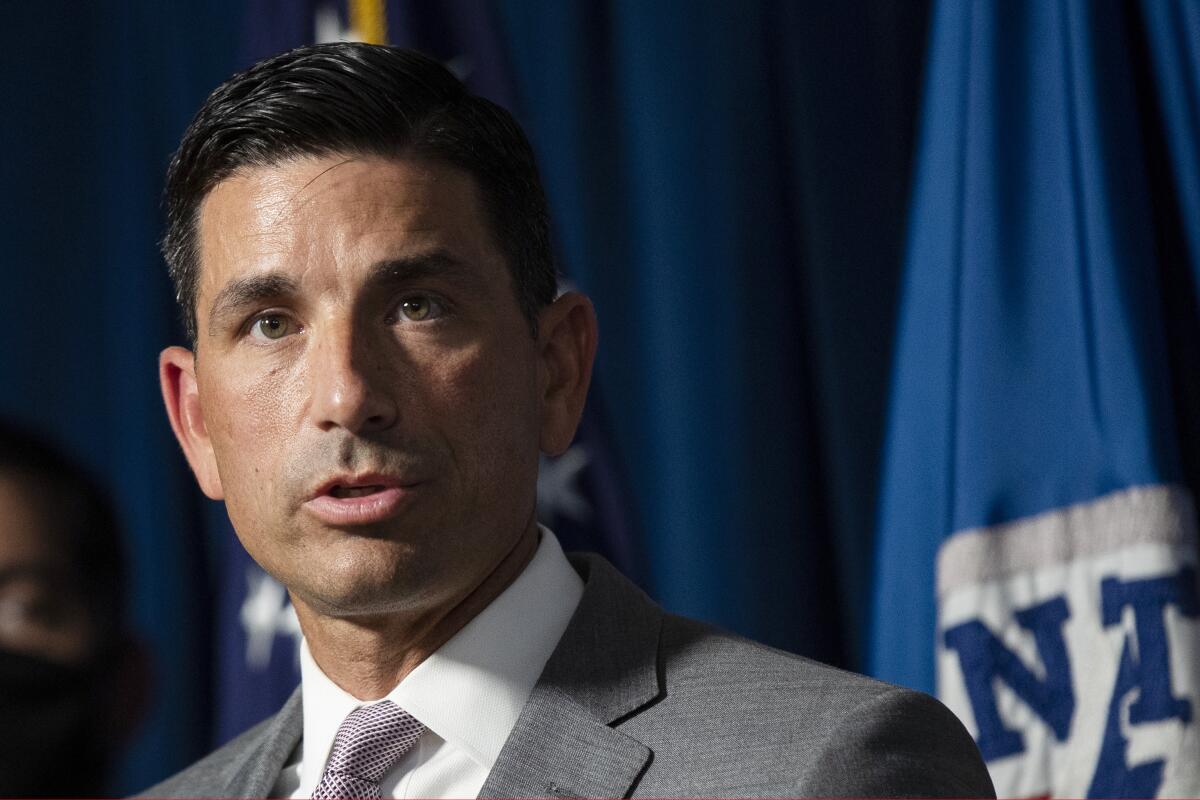Trump’s troubling preference for ‘acting’ appointees

- Share via
President Trump has flouted so many constitutional norms that it’s hard to keep up with them. But one of his most flagrant violations has been his end run around the Constitution’s requirement that important appointments be made with the “advice and consent” of the Senate.
In defending that provision in the Constitution, Alexander Hamilton wrote in the Federalist Papers that the requirement of Senate confirmation would be “an excellent check upon a spirit of favoritism in the president, and would tend greatly to prevent the appointment of unfit characters from state prejudice, from family connection, from personal attachment, or from a view to popularity. In addition to this, it would be an efficacious source of stability in the administration.”
Trump has a different idea, frequently delaying the Senate confirmation process by appointing “acting” officials in top posts rather than permanent ones. Some critics add another complaint, accusing him of violating laws governing who’s eligible to serve as an acting secretary or deputy. Last year he famously said that “I sort of like ‘acting’ . . . it gives me more flexibility.” In February, Aaron Blake of the Washington Post reported that Trump had already surpassed the number of days in which acting officials served in the two terms of the Obama administration.
A good example is Chad Wolf, who has served more than nine months as acting secretary of the Department of Homeland Security after having been confirmed by the Senate to a lesser position in the department. In mid-August, the Government Accountability Office, a congressional watchdog, released a report concluding that Wolf’s appointment was invalid, as was that of Ken Cuccinelli, who has been performing the duties of deputy Homeland Security secretary. Less than two weeks later, Trump said that he would nominate Wolf to serve as the department’s permanent secretary.
The administration disputed the GAO’s conclusion, arguing that Wolf was lawfully acting as secretary under a law governing succession in the Homeland Security Department. Regardless, belatedly appointing Wolf on a permanent basis would remove the confusion. (Wolf himself conceded in a recent interview that “I strongly believe that the department needs a confirmed secretary.” )
Wolf’s nomination also will give the Senate the opportunity to decide whether he is entitled to the position — as the Constitution envisions. Wolf must be asked about his role in the deployment of Homeland Security personnel to Portland, Ore., where they were accused of detaining protesters without probable cause far from federal property, and his continued determination to end the Deferred Action for Childhood Arrivals program. Wolf has called the program “unlawful” and has instructed his department not to consider new DACA applications, despite a federal court order to do so.
This isn’t an isolated case. After Trump forced out Atty. Gen. Jeff Sessions, who had angered the president by recusing himself from the investigation of Russian meddling in the 2016 election, Trump tapped Matthew Whitaker, a Sessions aide, to head the department temporarily — even though there was a Senate-confirmed deputy attorney general, Rod Rosenstein, who could have served as acting attorney general.
Dan Coats resigned as director of national intelligence last summer. Although Trump indicated at the time that he would nominate Rep. John Ratcliffe for the post, Ratcliffe withdrew his name, only to be nominated this year after he changed his mind. Nine months passed between Coats’ departure and Ratcliffe’s confirmation, during which Trump named two acting directors. The second appointee, Richard Grenell, wasn’t an intelligence expert; instead, he’d won plaudits from Trump for his sharp-elbowed work as Trump’s ambassador to Germany.
Most recently, Trump installed Anthony Tata, a retired Army brigadier general and Fox News commentator, in a key Pentagon position that did not require Senate confirmation after a Senate committee canceled a hearing on Tata’s nomination to be undersecretary of Defense for policy and the nomination was withdrawn. Tata came under fire after reports that he had called Islam the “most oppressive violent religion I know of,” and referred to former President Obama as a “terrorist leader.”
Regardless of who is elected president in November, Congress needs to revisit the issue of how to ensure that there aren’t gaps in the leadership of the federal government without allowing presidents to fiddle with the chain of command and procrastinate in sending nominations to the Senate. Rep. Katie Porter (D-Irvine) has proposed legislation that would limit the time officials could serve in an acting capacity and prevent presidents from appointing acting officials who lacked qualifications required for a Senate-confirmed occupant of the office.
But the problem isn’t just a matter of inadequate or confusing statutes. Trump’s willingness to so undermine the advise-and-consent process — with acquiescence from the Republican-controlled Senate — is part and parcel of a larger contempt for the rule of law. It is one of many reasons why he must not be reelected.
More to Read
A cure for the common opinion
Get thought-provoking perspectives with our weekly newsletter.
You may occasionally receive promotional content from the Los Angeles Times.









